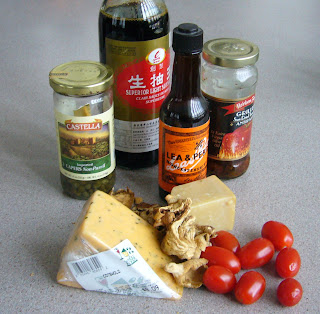 Taste is a complicated phenomenon whose study goes back to Aristotle or beyond, depending on which culture you're examining. The tastes we in the Western world usually identify are salty, sweet, sour, and bitter. Those are identified by sensory receptors on the tongue, which change chemical signals to electrical potential and send this to the brain via the nervous system.
Taste is a complicated phenomenon whose study goes back to Aristotle or beyond, depending on which culture you're examining. The tastes we in the Western world usually identify are salty, sweet, sour, and bitter. Those are identified by sensory receptors on the tongue, which change chemical signals to electrical potential and send this to the brain via the nervous system.Of course, flavors are much more complicated than merely a combination of those four sensations. The mouth also senses temperature, astringency, spiciness, thickness or "mouthfeel," and so on, which contribute to our perception of taste. And of course most of what we perceive as flavor actually comes from the olfactory cells in our noses, which can recognize something like 35,000 smells.
Umami--Japanese for "essence of deliciousness"--is sometimes called the fifth taste. Umami describes the hearty or savory sensation common to meats and cheeses, for example. It refers to the detection by specialized receptors on the tongue to the amino acid glutamate. Capers, soy sauce, ripe tomatoes, mushrooms, fish stock, oyster sauce, nuts and anchovies are all high in glutamate.
Glutamic acid was isolated in 1866 by German chemist Karl Ritthausen and developed as a food additive in 1908 by Tokyo Imperial University professor of chemistry Kikunae Ikeda. It's Ikeda who came up with the term "umami."
Dr. Ikeda went on to patent MSG (monosodium glutamate) and joined with the Suzuki Pharmaceutical Company to manufacture it as Aji-no-moto seasoning. In the U.S., the best-known brand is Accent. MSG became increasingly popular internationally until the 1970s, when controlled studies showed its toxic potential. Although most companies voluntarily removed MSG from their products around that time, they continued to use MSG-containing ingredients such as autolyzed yeast and hydrolyzed vegetable protein. These "hidden" sources are called "clean-label" ingredients.
Unless you grow your own food, it's almost impossible today to stay away from umami. Almost every processed food except sweets contains glutamates. Crops are sprayed with it, and it's added to vaccines, IVs, pharmaceuticals, and cosmetics.
Why would you want to stay away from it, though? Umami means deliciousness, after all. Well, for one thing, it's been linked to adverse reactions in people with allergies, autism, and seizure disorders. "Clean labelling" makes it a nightmare for those with medical or health concerns to get accurate information about the food they're purchasing.
And suddenly, umami is the new hot thing. Chefs are creating "umami bombs" of flavor. Whole books are being written about it, as though fish sauce hasn't been around since the Romans. And that's all fine. I personally love rich, hearty flavors and don't have any known sensitivities to foods. I've been preparing umami-rich meals for 40 years, although nobody was labelling them as such.
But my heart goes out to those tireless mothers struggling with autism, epilepsy, food allergies, and the like, who put so much effort into healthful diets for their children. And to those parents who aren't knowledgeable about diet issues, and are bewildered by the symptoms their children display, and can't even put two and two together because the food lobbies surpress so much information.
Parmesan cheese...good. Capers...good. Soy sauce...good. Food fad masquerading as fabulous new discovery...yawn.
No comments:
Post a Comment